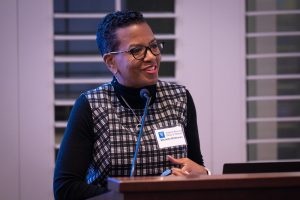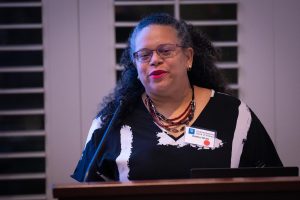Post From Expert Insights
On November 13, 2023, Build Healthy Places Network hosted a multisector interactive discussion and celebratory reception at the Federal Reserve Bank of Atlanta in partnership with the Center for Community Progress, Enterprise Community Partners, Federal Reserve Bank of Atlanta, Purpose Built Communities Foundation, and Reinvestment Fund. It aimed to provide public health and healthcare partners attending the American Public Health Association (APHA) annual meeting an opportunity to meet community development professionals and learn from a panel of health and community development practitioners on how to foster collaborations across sectors that advance racial equity.

Raphael Bostic, President and CEO of the Federal Reserve Bank of Atlanta, provided opening remarks. Photo credit: Federal Reserve Bank of Atlanta
Panelists shared promising practices from their own multisector partnerships and how investments in neighborhood conditions and prioritization of community owned strategies can tackle the root causes of racial health disparities. This included efforts in Atlanta to create more affordable housing to improve residents’ health and wellbeing. For example, Atlanta Neighborhood Development

Colleen Flynn, Co-Executive Director of BHPN, moderated the evening’s panel. Photo credit: Federal Reserve Bank of Atlanta
Partnership (ANDP), a community development corporation, is leading a collaboration with CareSource (a nonprofit Medicaid provider) to acquire and rehabilitate 75 single-family homes that provide affordable rentals across the Metro Atlanta region. To initiate the partnership with CareSource, ANDP used casemaking to demonstrate the acute need for housing stability and affordability and the direct effect on health outcomes as rents in Atlanta skyrocketed. In the Sweet Auburn neighborhood of Atlanta, MercyCare, a federally qualified health center is one of several co-investors in McAuley Station, a 170-unit multifamily development with a mix of workforce
housing, affordable and permanent supportive housing units. One key component was ensuring the new housing development created access to other needed services to advance health outcomes, adopting a holistic approach to health. This project is adjacent to a Mercy Care’s clinic, a park, and transit station.

Michelle Matthews, Executive Vice President of Strategy and Impact at Purpose Built Communities and a BHPN’s National Advisory Council Member, gave a synthesis of the panel. Photo credit: Federal Reserve Bank of Atlanta
Speakers also highlighted collaborations that are centering community voices. Reinvestment Fund’s Invest Health Missoula team is a multi-sector coalition led by a public health entity that makes neighborhood voices central to their work. Their efforts culminated in meaningful engagement of residents to embed health equity and anti-racist strategies into key city policies and plans and the creation of an advocacy arm to help continue this work. To help put strategies into action, the panel shared NACDD’s Social Justice Framework for Public Health Practitioners, a guide to help operationalize steps that ensure that community voice is centered through intersectional, interdisciplinary, and cross-sector collaboration.
A snapshot of key takeaways and action steps for partnership development:

Odetta Macleish-White, Director of Georgia Initiatives at the Center for Community Progress, gave closing remarks. Photo credit: Federal Reserve Bank of Atlanta

Urban Youth Harpist at the reception. Photo credit: Federal Reserve Bank of Atlanta
Community Development and Health Ready Made Partners
We believe partnerships between healthcare, public health and community development are vital to advance neighborhood investments that address the root causes of racial inequities and prioritize community owned strategies in their work. Coming out of the pandemic, the public health sector is undergoing an unparalleled period of transformation. This re-building presents a unique opportunity to seed stronger awareness of the community development and healthcare sectors as go-to partners for impacting health. It’s estimated that the healthcare sector spends $3 trillion annually treating preventable conditions that are overrepresented in disinvested neighborhoods, predominantly neighborhoods of color where people lack stable, affordable housing, access to healthcare, education, collectively, the Vital Conditions for Health and Well-Being. Healthcare is beginning to establish pathways to connect individuals to services to address social needs but community conditions driving health remain largely outside of healthcare’s investments. Meanwhile, the community development sector is a multi-billion-dollar sector investing in persistently disinvested communities through the development and financing of affordable housing, schools, grocery stores, health clinics, and small businesses. There is an opportunity for all three sectors to work together to take their collective work farther upstream, to shift values, narratives, policy, power, and economic conditions to center community needs and voice. Please email info@buildhealthyplaces.org if you are interested in partnering across sectors in your community.